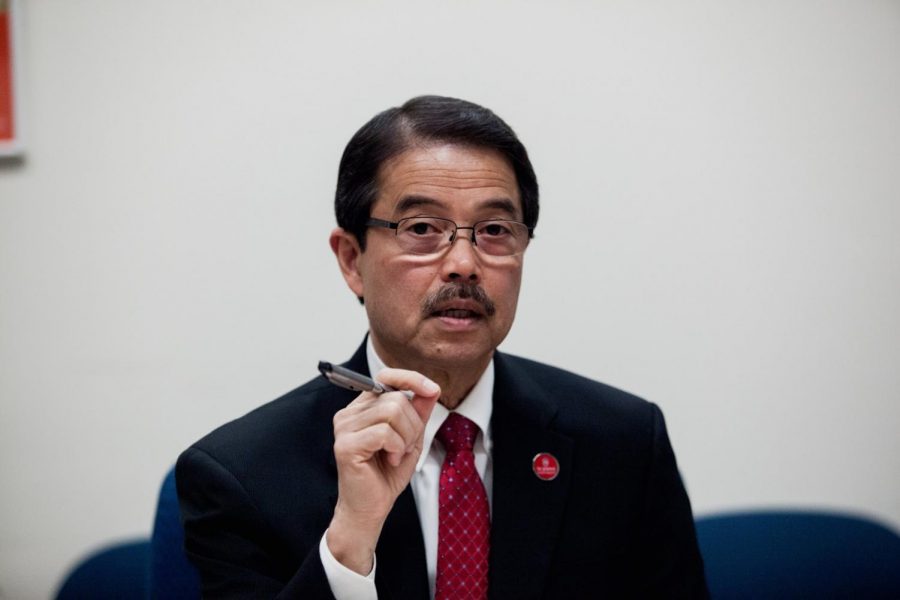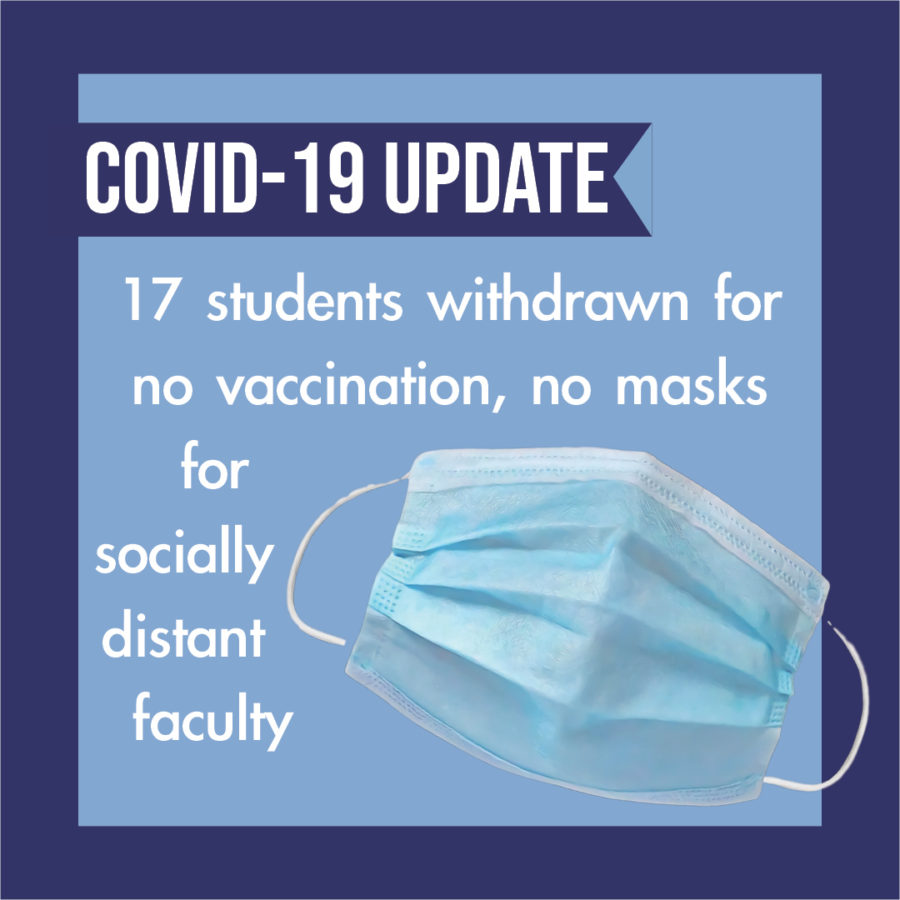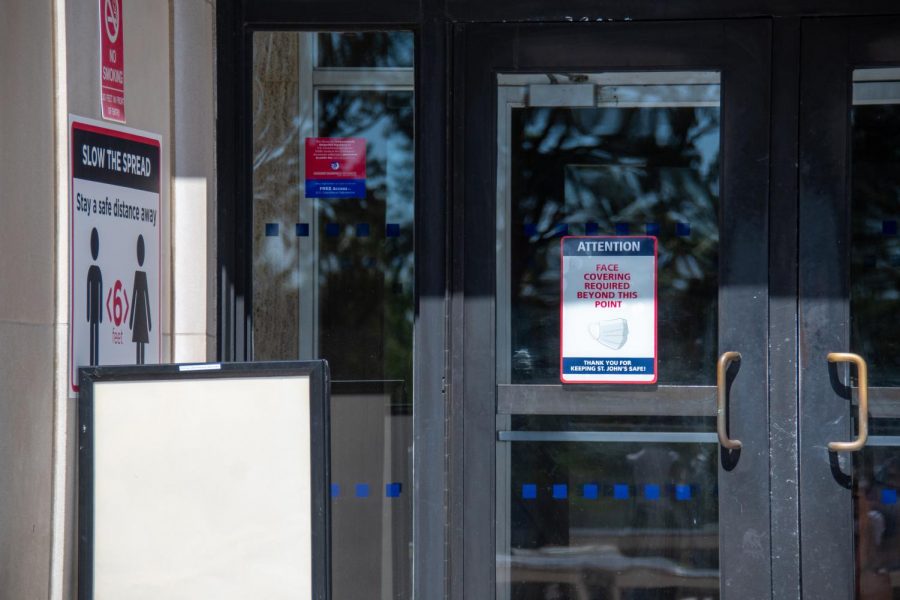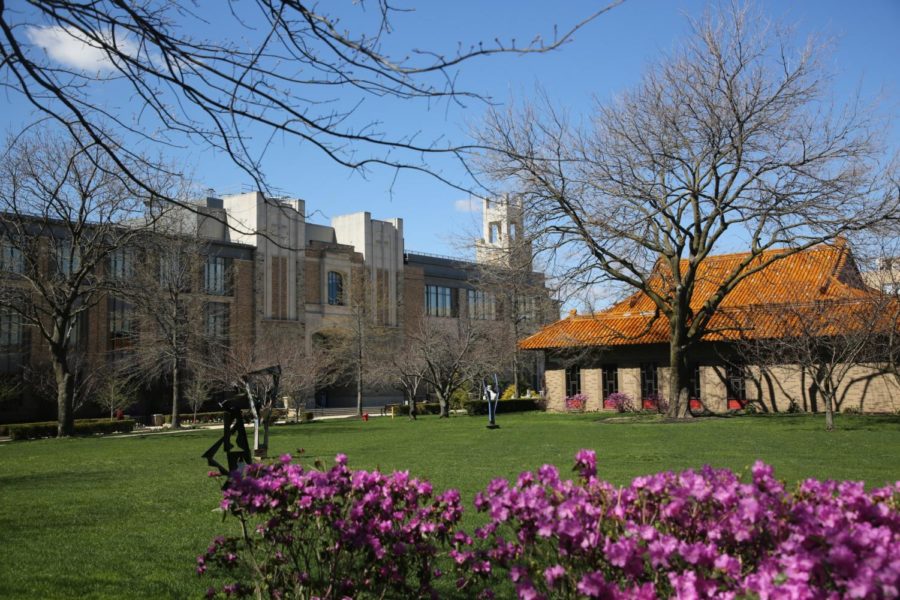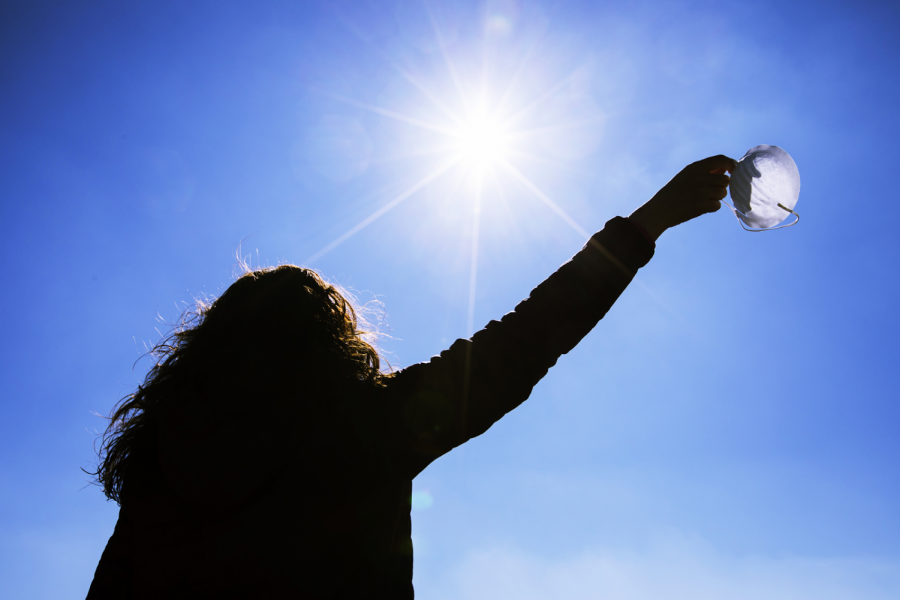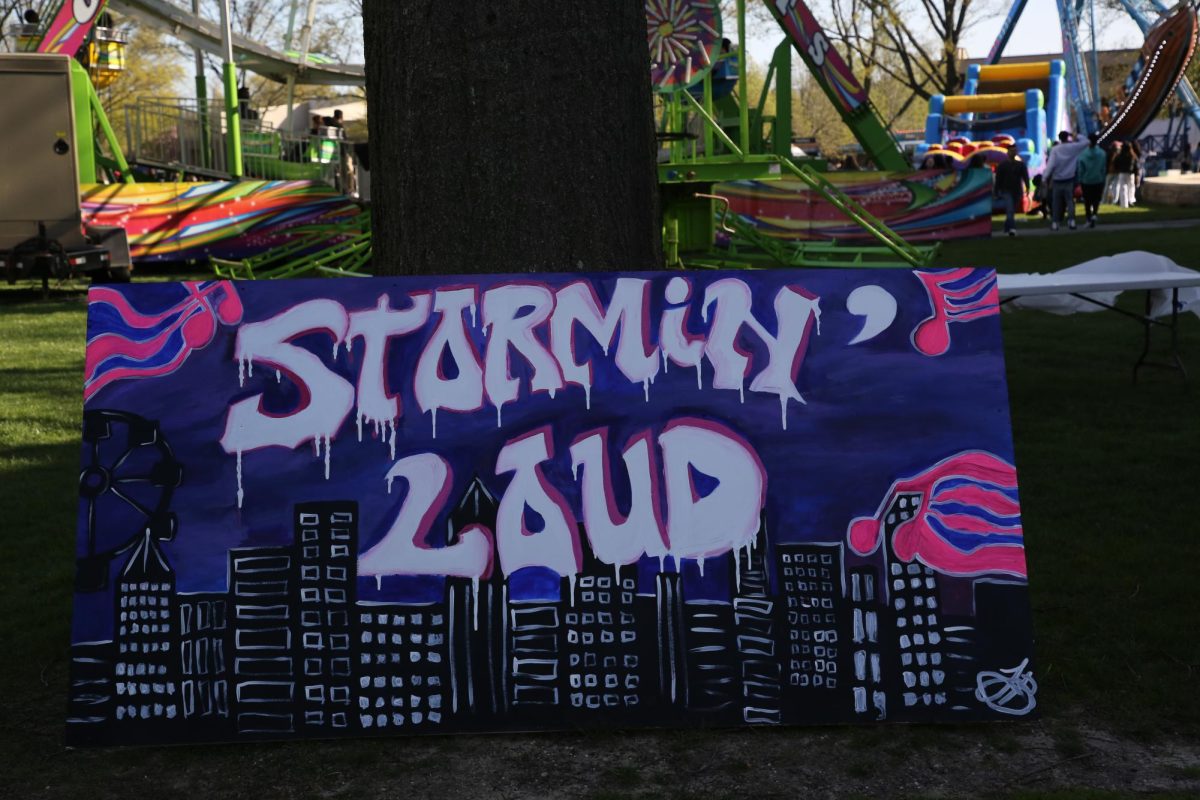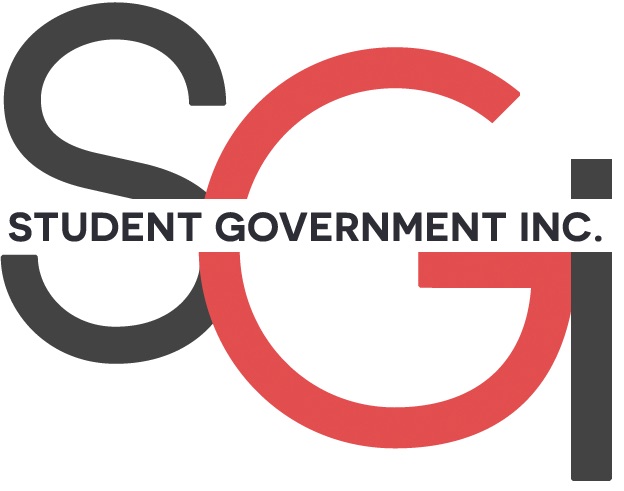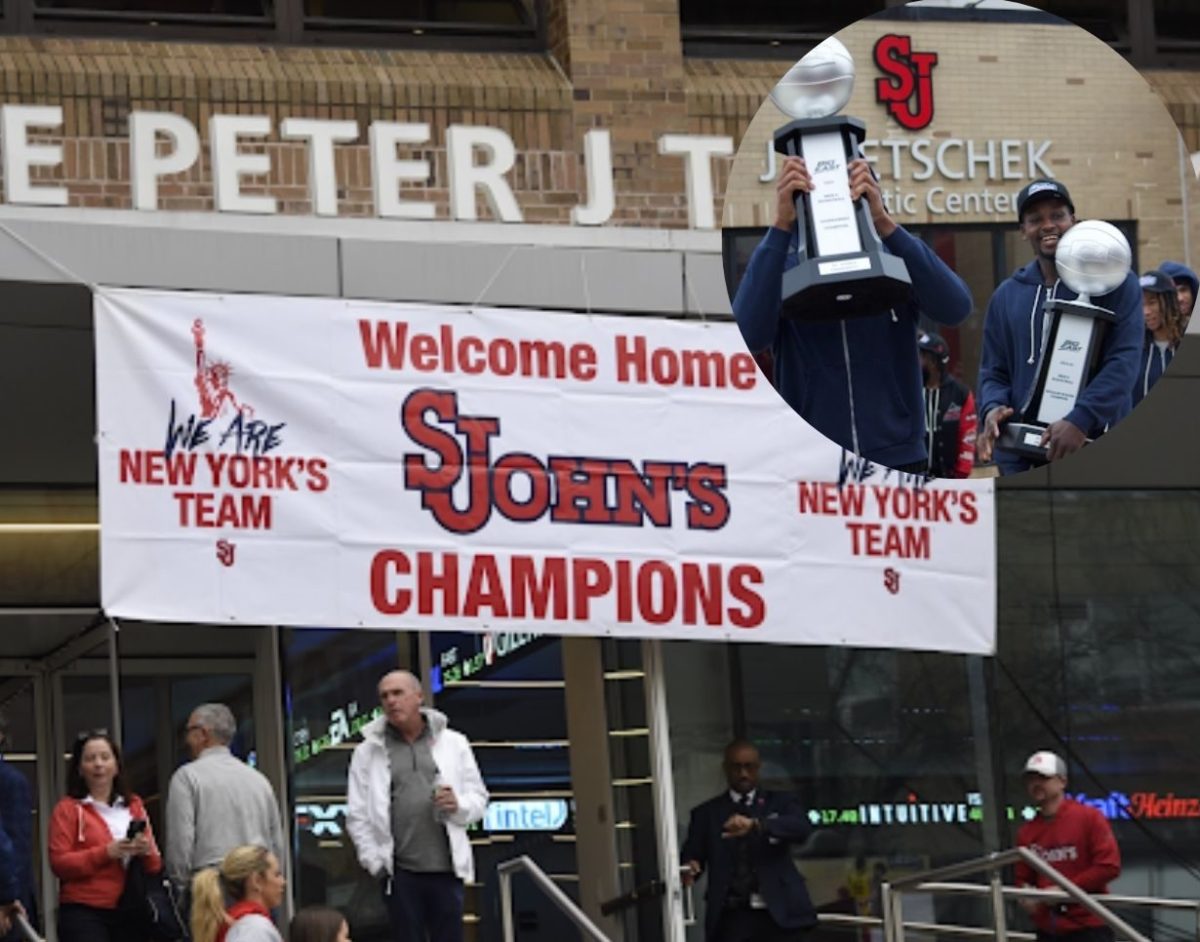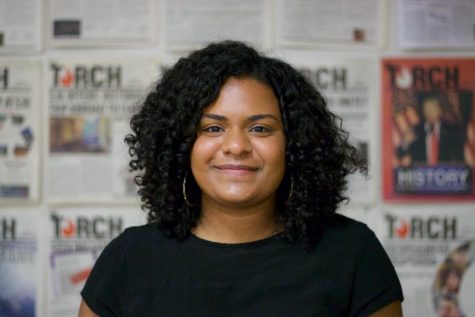The last time the Torch sat down with University President Conrado “Bobby” Gempesaw was during the fall 2019 semester to discuss an array of topics, from housing and food insecurity to what makes a happy student. Only four short months after this interview, the COVID-19 pandemic in the U.S. quickly escalated and in-person classes were terminated. Students were sent home and most people, including President Gempesaw, have been practicing social distancing from their homes for more than 50 days.
The Torch reached out to President Gempesaw to request a video interview in early April — he declined, but we were able to email questions through a University spokesperson. We asked him about how the University has made certain decisions in these past few months and how they will continue to do so going forward; how tuition may be impacted come fall, how employee salaries have been impacted, when resident students may be able to claim their belongings and about the future of the Global Studies program, among other things. Read on to see what President Gempesaw had to say.
WHAT MIGHT THE FALL SEMESTER LOOK LIKE?
President Gempesaw told the Torch that the University is planning for a return to on-campus instruction this fall.
With the announcement of the Return to Campus Task Force (RCTF) last Friday, Gempesaw stated that this group has been tasked with planning for both a safe return to campus and for creating contingency plans that take into account the possibility of public health guidelines forcing the extension of remote learning and working. Over the past few months, decisions have been made following most prominently government mandates, public health guidelines and recommended best practices — the RCTF will abide by these same guidelines.
“The Vincentian question of, ‘What must be done?’ has taken on new and significant meaning during this challenging time at St. John’s, and that question is quickly followed by ‘What is in the best interest of the St. John’s family?’” Gempesaw said of the questions both he and administration consider (alongside the country’s health mandates) when making decisions for the University community.
Amid speculation that there could be a spike of COVID-19 in the fall, there is growing worry that classes may not resume in-person. The task force is meant to consider this possibility as well, with their “five key areas” of concern being social distancing strategies, health and safety measures, outbreak response, communication planning and mental health counseling.
How will the RCTF consider the future of housing on the St. John’s Queens Campus? The task force is planning for a “new normal;” one of these scenarios being the resumption of on-campus operations with the option of housing.
As for continuing resident students, whose belongings are still in their dorm rooms and whose housing selection dates have been postponed until further notice, Gempesaw said when these students can return to acquire their belongings is dependent on public health guidelines. May 15 is both Governor Cuomo’s benchmark for determining what businesses and services can resume operating and the date given to students in the most recent email from Residence Life, sent to students on April 22, for when they will hear back about their housing selection dates for the fall 2020 semester.
The University hopes to share the RCTF’s recommended plan of action that will include all of these factors with the campus community by this summer.
Regardless of what the fall semester looks like, it is clear that students will need more resources than ever before. Whether they themselves have been personally affected by the pandemic or someone in their personal circle has, the emotional, psychological and financial needs of students have transformed in the face of the pandemic.
The president said an expansion of existing student support initiatives is already underway with a focus on issues arising from COVID-19. The Office of Student Financial Services is surveying students to determine the impact of the pandemic on their health, wellness and financial situations. Mental health counseling is ongoing and the president says the University is planning how to best meet all other needs of students.
“St. John’s institutional aid combined with federal money will quickly be allocated to students with different levels of unmet needs,” he said.
THE INCOMING STUDENT BODY
It goes without saying that after months of uncertainty, students are ready to hopefully go back to campus and start fresh — but what about incoming freshmen and other newly enrolled students who have had an unconventional introduction to their new home at St. John’s?
“As long as stay-at-home guidelines are in force, we will do our best to provide a virtual home for our current and incoming students,” Gempesaw said.
“Accepted Student Day is one very good example of how St. John’s leveraged our technology to host an annual event in a digital format,” he continued. “Our efforts and investments in new technology, in professional development and an emphasis on connecting and communicating with students across multiple digital platforms over the last few years, proved most beneficial when the University had to quickly transition to a remote learning model.”
“With the COVID-19 crisis, we are mindful that for many students, this has created new and unanticipated hardships and has added to their ongoing challenging circumstances. Our retention strategies will continue to be personalized for individual students and tailored to assist in the best way possible,” he said. “We want our current and incoming students to know that they are part of the St. John’s family and we will do our best to help them succeed.”
WHAT DOES THE FEDERAL GOVERNMENT’S CARES ACT LOOK LIKE FOR ST. JOHN’S?
St. John’s has received $12.1 million from the U.S. Department of Education under the federal government’s CARES Act. Under the CARES Act, institutions of higher education are mandated to use no less than 50 percent of the money to provide eligible students with financial aid grants for expenses related to the disruption of campus operations due to COVID-19.
President Gempesaw specified that these funds would be allocated particularly to students who “demonstrate the greatest financial need.”
The remaining balance is then available to the University to cover costs associated with the changes in academic instruction caused by the pandemic. The CARES Act does have several restrictions — most notably the student must be eligible for the Free Application for Student Aid (FAFSA). This requirement subsequently excludes DACA recipients, international students and undocumented students.
Apart from the CARES Act, St. John’s also established the Emergency Aid Fund, funded entirely by donations. The Office of Advancement launched a campaign to raise money for this fund, which is administered by the Division of Student Affairs in collaboration with the Office of University Mission and Campus Ministry. “I am grateful for the generosity of alumni, employees, benefactors, and the Student Government, Inc. who quickly helped to raise close to $260K in support of the Emergency Aid Fund for St. John’s students.” Gempesaw said.
“These funds were made available before the CARES Act was announced and were distributed by the Division of Student Affairs through the Basic Needs Form to currently enrolled students including international, graduate and law students independent of citizenship status,” he said.
HOW MIGHT HYBRID CLASSES OR ONLINE COURSES IMPACT YOUR TUITION?
In the event that students will be required to enroll in hybrid or online classes, President Gempesaw offered this as to how this may impact tuition.
“At this time, the Return to Campus Task Force will consider various scenarios with a focus on developing a pathway for a return to on-campus instruction and business operations this fall semester,” he said. “As a Catholic and Vincentian institution, St. John’s mission is to help those most in need. Even before COVID-19, the University has been providing significant institutional aid to support students with various scholarships and grants. We will strive to continue to help those most in need given the current COVID-19 crisis impacting our community.”
Other universities, including Pennsylvania State University, have announced plans to freeze tuition for the 2020-21 academic year. This does not appear to be in the playbook for St. John’s. While this was an action taken by the University back in 2015, President Gempesaw described plans to continue to offer financial aid to students in the wake of COVID-19.
“The challenge is finding a holistic approach that is both sustainable and equitable now and in the years to come since we have many constituents with differing needs,” Gempesaw said. According to the president, the Office of Student Financial Services has been reaching out to incoming and continuing students to assess the impact COVID-19 has had on their individual needs.
“Last year, more than $269M in institutional aid was awarded to support students so they can continue their studies at St. John’s. In fact, more than 96% of our students receive some form of financial aid from the University,” he said. “The Office of Student Financial Services will make the decision on the allocation of our budgeted financial resources for direct student support. There are many ways to help our students.”
HOW HAS STAFF BEEN IMPACTED?
Students are not the only ones impacted by this pandemic — we asked the president how this crisis has impacted salaries and the hiring process for most University employees.
“At this time of unprecedented economic challenges and workforce disruption, unlike many other institutions of higher education, St. John’s has not laid off or furloughed any University employee,” Gempesaw said. As the year progresses, the University will continue to assess enrollment and budget projections when considering layoffs or salary cuts and “make the necessary decisions at the appropriate time.”
As for the salaries and benefits of faculty and employees from outside vendors — those who work in Montgoris Hall, the D’Angelo Center, Starbucks, Marillac and the Redstorm Diner — “they are governed by the terms of their existing collective bargaining agreements and contractual arrangements with the University.”
During the past several years, St. John’s has also instituted several initiatives geared toward diversity and inclusion in their hiring practices. This has been a controlled hiring process, in order to ensure that the decisions regarding new hires are fiscally responsible and that resources are aligned with the Strategic Priorities Action Plan. When asked whether there will be a hiring pause that will affect these diversity and inclusion goals, the president answered, “Our foremost priority is to ensure student success and our budgetary decisions will continue to be guided by our Strategic Priorities.”
WHAT WILL BECOME OF GLOBAL STUDIES?
St. John’s is a metropolitan, Vincentian, Catholic and global university – with two campuses overseas in Europe, over 40 percent of students participating in global programs and 1,210 international students from 127 countries attending St. John’s, according to the Office of International Studies. What will become of the global wing of this University?
“We understand that the impact of COVID-19 on travel restrictions will make global programming and international student recruitment all the more challenging,” Gempesaw said.
COVID-19 is currently impacting 185 countries globally and the president said that the University will have to reassess how they may be able to continue global programming for students. In terms of international students at St. John’s, the University will have to strengthen their recruitment efforts, given that travel restrictions have shifted, in order to enroll these students during the “new normal” that continues to develop.
“One important lesson the COVID-19 crisis has taught us is that we are all part of a larger global family,” Gempesaw said.
WHAT CAN WE AS AN INSTITUTION AND A COMMUNITY LEARN FROM THIS EXPERIENCE?
These are unprecedented times and our community of students, administrators, faculty and alumni have all been impacted in different ways. We will never be the same and will have to adjust to whatever the “new normal” is going to look like. President Gempesaw looks to the “Spirit of Service” of the St. John’s community for what lessons can be taken from this tragedy.
“From the first moments of this crisis to this very day, our faculty and employees have gone above and beyond to quickly transition to remote learning and remote working so we can continue our academic and business operations,” he said. “I commend our students for their patience, understanding and hard work in adjusting to the unexpected and sudden transition to online learning.”
President Gempesaw said he is proud of the volunteer work of both employees and students that has taken various forms – from the creation of handmade masks to the donation of nearly 200,000 units of medical supplies to New York-Presbyterian Queens Hospital facilitated by faculty from the science department, St. John’s community members have stepped up across the city to aid our front-line first responders.
“When things are at their worst, St. John’s is at its best and our Catholic and Vincentian mission will guide us during this unprecedented crisis of our lifetime. Over the past 150 years, the St. John’s family has endured many external forces and trying times,” Gempesaw said. “We emerged from all of these challenges stronger and steadfast in our enduring mission. I have no doubt that by working together, St. John’s will do the same once more.”
If you enjoyed reading and would like to continue reading more articles like this, please consider donating to the Torch here to support student journalism and #KeepTheTorchLit. Make sure to sign up for our newsletter where we keep you updated on all things St. John’s, and more!



